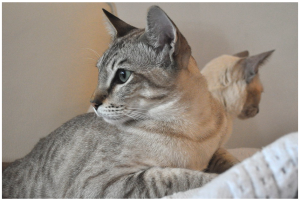Like humans, cats can create drama and sometimes start viciously fighting with each other. If handled well, your helping hand can speed up the peacekeeping process significantly.
Not rarely, cats that previously got along can suddenly start despising each other. The cause is usually induced by stress or a disturbance in their habitat:
Possible causes:
- a return home from the vet, accompanied by strange smells (which is why I usually take both of my Tonks together or have the vet make house-calls),
- pregnancy hormones and instinctual protectiveness against any potential kitten-killing males,
- a disturbance in the household such as moving house,
- food quarrels,
- jealousy,
- illness or pain…
The onset can be brought on by a myriad of factors, but luckily, just like humans, they can learn to bury the hatchet too.
The following tips can also be applied when introducing new cats; especially with adult cats, since kittens are generally accepted by existing pets more easily.
Tips:
Keep in mind that these suggestions should be applied as components of a process instead of seeing them as free-standing work-for-all solutions. Ideally, every preceding tip should be fulfilled before proceeding to the next one.
1) Keep angry cats apart until they’ve cooled down. New cats brought into a home with pets should first be kept separate to acclimatise. Let them get accustomed to each others’ presence and smells before letting them see each other, for example by switching up their bedding or having them get used to eating at opposing ends of a door.
2) When first (re)introducing them, let them see each other through a window or from a safe distance where they can’t get at each other.
3) First and foremost make sure that your cats don’t get the opportunity to fight. Every new conflct will delay or inhibit progress. When they hiss at each other or pull their ears back, try diverting their attention, blocking their vision or removing them from the situation altogether (whilst not endangering yourself).
4) (Re)introduce them slowly when all cats are at their calmest, starting from a safe distance (after the window trick), slowly moving closer when appropriate. Keeping in mind point 3, it could be a good idea to keep the agressor on a leash just in case he tries to lash out unexpectedly. Make sure good escape routes and hiding places are made available.
5) Stay calm. If you start shouting or panicking they will get even more distressed and aggressive. Shouting when they start a fight is the worst thing you can do. Distract them instead, and promptly remove one of the cats to another room to let them calm down (keeping your own safety in mind). Ignore bad behaviour rather than punish. Do the cat-blink.
6) Give loads of positive reinforcement as soon as they show signs of improvement (or when they stay calm in the presence of the other cat). If they associate being close to each other with a positive, calm owner and lots of affirmation, they’ll be more likely to (re)adapt to each other more quickly. Lots of petting whilst talking to them in a calm voice tends to do the trick. Giving them treats may not always be the best way to award these improvements, since food in itself can act as a trigger for new conflicts.
7) Keep an eye on them when they first appear to get along (again) and don’t leave them alone together until things have cooled down for a long enough time and you’re confident that the issue has been resolved. Reinforce and coax every time they get close to each other or ultimately even start grooming each other again. If it’s clear that you prefer and award this good behavior, odds are they’ll keep it up.
7) Make sure the problem isn’t health or hormone related. Dominant, uncastrated males or pregnant females can be especially vicious or protective. Pain or illness may also evoke aggression. Castration and sterilisation often works miracles.
8) Make sure it isn’t due to neglect, stress or boredom and don’t forget to keep them entertained and content! Never skip playtime.
9) Jealous cats who crave attention sometimes seem to work it out on their peers. Keep their tummies full so they don’t need to fight over food, and watch out especially for competitiveness when serving them something they really love.
10) Cat drugs (catnip, valerian, cat thyme or cat’s foot, honeysuckle or silver vine) can have calming effects.
11) If all else fails, try Feliway Friends and see your vet or a cat therapist for professional advice (renown Belgian cat therapist Karin Weuts based in Antwerp for example www.kattengedragstherapeut.be). Medication or re-housing should only be considered as a last resort.




